Further Poseidonals

May 26
It was told that when Poseidon began to pursue Demeter {Da, an ancient name for Gaia, and Mater, “Great Mother”} with amorous importunance, the goddess was already engaged in seeking her abducted daughter Persephone. Demeter turned herself into a mare and mingled with the grazing steeds of King Onkios. Poseidon perceived the trick, and coupled with Demeter in the shape of a stallion. The wrathful goddess turned into Erinys, the goddess of anger, and was actually called Demeter Erinys until she washed away her anger in the name Lousia. She bore to Poseidon a daughter, whose name might not be spoke outside the Mysteries, and at the same time she bore the famous steed Arion, the horse with a black mane. Arion inherited its black mane from Poseidon -- so the story was conceived even in times of great antiquity.
-- Carl Kerenyi, The Gods of the Greeks
FILLY
Oh she was a filly all right,
gold-maned and wild as hell
and twice as cruel.
I found her grazing with her
sisters in an oyster bar
on SR 44, a mile down from
the St. John’s colossal river float.
Saw those flanks asheen with
blue neon as she tossed back
whiskies at the bar & I was shot
clear through by the hottest
barb in Cupid’s blueballed
quiver. Yee haw! I shouted
as I chased her all that night,
her every feint and ruse
keeping her just out of reach
as we thundered across the
cracker steppes which
precede and invoke every
one-night stand. I cornered
her at last in her trailer at 5 a.m.,
mounting her pale perfect flanks
and plowing hard and fast and
deep, remitting at last the burn
in which she broiled me.
I watched her face twist
in the most delicious rage,
her O-mouth spitting curses
as she came, her huge eyes
slitted and rolled back into
infernal regions of dark pleasure
not found on any night but
is their secret hoard and treasure,
the bottomless region of
every whiskey glass. Afterward
we smoked in the frail
lucence of a full moon far
to the west, our sweat drying
in the breeze of an opened
window ripe with citrus blossoms
and the stench of roadkill
coming off the nearby road.
Oh you should have seen my sperm
spooring down her thighs
in lazy runnels of sea foam,
more than any womb can
harbor, more than an man
has thrown! I told her
of my patronage and rule
amid the horses of th sea,
those wild-maned blickers
of brine iniquity, whose
hooves pour like booze
down every wanton throat
the devil’s own red shoes.
She only smiled, her face
half-hidden in a post-fuck,
inward pent, her eyes
turning dark and darker
as her newly roused anger
turned first light to stone.
Her fury knew no bounds
as my children in her swelled;
she took to terrorizing every
bar and truck-stop in
North Florida, bidding
bad men take her in the woods
for a trick where she pulled
their own pants down,
nailing them for good.
In time she bore
the daughter who never
speaks her name -- the
autistic Persephone who
ever turns away -- And
also the horse Arion
with the wild blueblack mane
who indeed may be
the coded sequitur of her.
Each of our children
was a fraught vesicle
of what that sight of
that filly testicled in furious fate,
for better and far worse.
Those two are out there
in the garden as this
far later incarnation writes,
the one a ciphered soror
who cries for every name
desire mounts and hollers,
the other my totem gallop
across seas and pages here,
my court this crashing shore
of blue in most dangerous roar.
Yes, she was a filly, that
sass Da Meter, mother of
the mother who nurses
all these lines, bestower
of the black hair in them
which manes in wet tiding.
She’s the Fury with the
sweetest ass to be
savaged in my mooning,
and our tropes endure to here:
A whisper in the pentas,
a whinny in the gorse --
the orgasmic silence of
the maenad stare
galloping forever as pure horse.
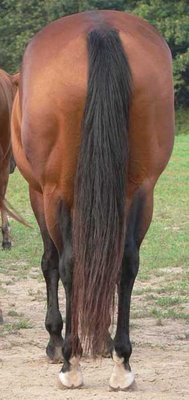
***
In the tale of the marriage of Medousa and Poseidon this mane became “the dark locks” of the god. When Persues had cut off the Gorgon’s head of Medousa -- a head which had the countenance of an Erinys -- forth from the neck of that bride of Poseidon sprang the magic horse Perseus. Anoter tale declared that the bride of Poseidon, she who bore Arion, was a Harpy. As I have already said, appellations such as Erinys, Gorgon and Harpy all mean the same thing.
-- Kerenyi, ibid

MEDEA
2002
Surveyor, sausage
deliveryman, retired cop,
state agent, parts store
owner, unemployed laborer:
all must have thought twice
before turning back to
pick her up: but lust is such a
common stay against the
dreary bloodings of age,
trumping all the suits
we thought to wear. Lust
is that lens which made her
so lurid for the press:
We see the bastards waiting
for her to catch up and climb
in, fingers drumming on
the wheel: feel the indecision
between forking up twenty bucks
for ten minutes of hateful sex
or peeling rubber back to
that job or wife where life belongs:
Feel the false privilege in the cab
of the truck as she climbs
up and in with heavy sigh,
country songs on K92
and a pint of Jack Daniels
now empty on the seat:
She palms the sawbucks
and then pointing back in
the woods where all the
action takes place: Feel
the goatish glee sour-mashed
with dread as they wind past
pine and palmetto to the spot
where a whore gets fucked
but good in the broad,
scadling light of a day
which unzips and rips:
The sense of enactment
is so precise that it takes a
moment to see .22’s snout
in her hands: To see beyond lust
to what’s really there, those pig
eyes meant to plead now
burning with a different
desire: To hear the gun’s
sudden yawps, two, four
times, maybe the entire clip:
Or what follows after all lust
collapses, the rapine
complete in the dripping
cab with the sharp smell
of cordite like sperm in
the air: To feel at last the
sense of justice, in turning the
whole perverse script of lust
on its hairy, indignant ass.
We loved the story which emerged
from the trial, reliving the passion
of her spree. Taking both sides.
Rooting for her one way,
in some other shadowing her
every bad step toward her end.
Everyone got what they deserved:
The rubes get rubbed out, the whore
our prick in the end. Someone
has to do the job. Mornings driving
in on 441 I pass a highway hooker
who’s worked that stretch for years.
She stands out from the dark
as if waiting for me in particular.
Our eyes lock for just one
second - I’m moving fast-
but it’s enough to feel that
ancient heat inside the
unkempt, thumbs-out gaze.
Inside every mark’s a Medea,
a cistern for paired lusts and
there for the taking, raking
hell on any hot, dreary
afternoon between here
and the next town, the next
enactment flipping its coin,
her tale, our fate.

May 28
Wet your whistle with wine now, for the dog star, wheeling up the sky.
Brings back summer, the time all things are parched under the searing heat.
Now the cicada’s cry, sweet in the leaves, shrills from beneath his wings.
Now the artichoke flowers, women are lush, ask too much of thier men,
Who grow lank, for the star burning above withers their brains and knees.
-- Alcaeus of Mytilene, 6th century BC
tranl. Richard Lattimore.
HEAT
2 p.m. and 96 degrees, so hot
the soaring sun cleaves its sear,
splitting wide the light a cracked
melon. Skies so blue and feral
you inhale the sea in it,
scenting pussy corals of desire
inside as savage salt which
soaks exactly what must never sate.
And from the season’s own
awakening the clouds begin
to mass, rousing sky-high clippers
of pure white, their keels
growing heavy, stained a
steely, fraught blue-black,
freighters of the sea
soon to hammer us with drench.
But not yet: Still the rouse
of rising heat, a tenor
brassed with nascent shriek,
a lust so nigh imperial
as to ram May’s thigh-wide hours
to hilt of every highest degree,
funking every sense with sweat,
the call of every passion hurled and met.

In Carl Kerenyi’s The Gods of the Greeks I read how Poseidon’s claim to the sea is what bred the sea-horses, caused something to appear in those waters which had never been seen before:
***
None of the gods who ruled our sea before Poseidon had anything to do with the horse ... Before there was anything like a sea-horse, a god shaped like a bull used to tow a goddess through the sea. Poseidon himself assumed this bull’s shape and in his quality of sea-god he had bulls sacrificed to him. For the bull, too, appeared on the shores of the Mediterranean much earlier than the horse.
Hippokampoi -- “horse-monsters” -- half horse and half serpent-like fish; sea-centaurs whose animal lower bodies were a combination of horse and fish; Okeaninoi and Nereids, with such names as Hippo, Hipponoe, Hippothoe and Menippe -- all these first appeared in the Greek sea when Poseidon had taken possession of it.

THE SEA-HORSE
May 27
Only when you claimed the sea
as Your birthright and deep rule
did the Hippocampusai appear,
horses with fins for hooves
and descending serpent-tails.
Also the sea-maids you wived,
Nereids and Okeananoi with
names like Hipponoe and Menippe.
Something happened in us
when you married equine to
aquaean, making the sea in
us your queen, a mare whose
green blue depths You ride
to every crashing shore.
In Your embrace of her
something became of us,
as if it were we who forfeited
forward land and sun to
dive back in first waters,
reversing every birth.
In You we thrilled to find
ourselves far stranger than before,
baptised by depths which
dappled soft low horrors.
Sailors busy at their watch
were enthralled with the
sweetness of the terror,
scanning the surge for nipply
naids whose siren song
saddles ships with a
dark descending pleasure.
Such stories came to birth
when You exacted Your
full measure offshore our
every coast, a naming which
changed the sea within
the heart, making us
more beautiful and terrible.
Your wet epiphany is
especially mine--a genus
locii or totem as You please--
because a strange emblem
crests my father’s coat
of arms, a naked fish-rider
who masts the family
enterprise of poetry and song.
(We have a harpist of
the sixth century in the
annals; he may appear
on St. Oran’s cross,
one of Columba’s twelve
to found the abbey on Iona.)
Non providenita sed victoria
is the motto written at the
foot -- “Not by Providence
But Victory!” -- and the
two I think delve You
deeply in song at least:
a naked fish-rider as
the one who fonts all
naked songs, battler
and romancer who
dares to say I Do
to the deepest sounds of You.
You leapt from our later
shores like a man out
from his clothes, embracing
surf with majesty. Surely
that stallion herd which
thunders down the shore
in restless infinitude
completes what can be sung:
A collapse of pure hellbent foam
which foals Your brilliant rung.
***
So there’s a myth for the conscious return to water,, or the self’s remittance of the only-conscious perspective, a delve and dive which is Poseidon’s, which is the essence of the Christian baptism -- the second birth, awakening a deeper child in later life. Horse of the sea, hippo- and hypo-, mare and mere, stout inference of the wave-rider’s paradigm.

Hot and hotter, as you might infer from the poem. Memorial Day weekend is always this way, the last blast of infernal rainless heat before the commencement of the rainy season. It’s been a lot hotter in years previous -- and smokier, like back in ‘98 when the rains came on the day the state was surely going to conflagrate, 500,000 acres smoking and the winds picking up again.
Yesterday my wife and I packed into her Toyota and drove over to Daytona for a rather superheated, listless foray thorugh a depressingly diminished rondo of thrift shops and anitique malls. That trade now seems passe, the customers dwindling due to the cost of gas or E-bay, rents going up, developers eyeing the mom-and-pop shops with a hunger and greed. We didn’t do too badly, though -- my wife found a beautiful ceramic bowl on the cheap in a place that was going out of business, and I got two AA books I needed at a place outside Deland (the fans in the place serving only to waft the dusty hot oppression of the room) and Bill Evans’ “You’ve Got to Believe In Spring’ on vinyl at a record shop in the Volusia County Flea Market.
Strange place, that flea market, or perhaps quintessential: 3 miles of booths spread out in six or eight long tin-roofed stalls, all indoor with these huge fans blowing overhead. It was filled with everything cheap and glitzy and random, t-shirts and boogie boards and sunglasses and leather thongs, incense and sabre-long knives, body piercings, vegetables, and office supplies. My wife was hoping for someting more antique and collectible but all that was ferreted into one air-conditioned corner building, maybe 20 booths in all, a third of them shut down. No: this place was for the brutally sunned acreage of coastal Florida and was packed with everyone trying to get out of the sun, plodding seniors, barely pubescent girls showing way too much, black teens in pajamas and slippers, fat mothers yammering on cell phones, vets talking shop in booths packed with military paraphanelia. As church on Saturday goes, it rivals the mega-Baptist congregations of Sunday; they are surely identical: desire and confession share the same guilty gonads housed in the shorts and the wallet.
For our foray, streets were packed with holiday traffic, lots of booming bass out of jazzed-up pickups, vans packed with families headed for beach, convertibles driven by blowsy aging Parrotheads. The streets blasted white, too bright for the eyes, and dilapidation everywhere, the riot and rot of the fun in da sun. We turned a few times off US-1 to look for a garage sale or get back to a shop and found brutalized neighborhoods of beat-to-shit trailers and ranch styles, a profusion of vehicles parked everywhere, boats covered with tattered tarps, lawn chairs in the yards and trash cans overflowing with empties.
There’s a ghetto in the sun, you know, the altar of surfeit, tended by mortals trapped in the desire for light ...

Kerenyi tells us more about who Poseidon married, what he entered in that sacred hymeneal:
Amphitrite and Tethys each was, beyond comparison with all other goddesses, and in however particular a sense, the mistress and proprietess of the sea, to whom belonged all foaming waves and sea-monsters ...
It was told that Poseidon espied the goddess Amphitrite as she danced with the Nereids on the island of Naxos, and ravished her. The story went on to say that Amphitrite feld from Poseidon to the western extremity of the sea, to Atlas or the palace of Okeanos, which lay in the same quarter. Indeed, it was a dolphin who persuaded the goddess and led her to her bridegroom. It was rewarded by being set among the stars.
After his marriage with Amphitrite, Poseidon was the ruler of our sea. The ruling ocuple resembled in many aspects Zeus and Hera; just as Zeus could simply be invoked as “Husband of Hera,” so Poseidon could be addressed as “Husband of Amphtrite of the the golden spindle.” Their nuptial procession was modelled on that of Dionysos and Ariadnew; not only horses, bulls and rams, but also stags, pantghers, lions and tigers appeared as marine monsters ridden by Nereids.
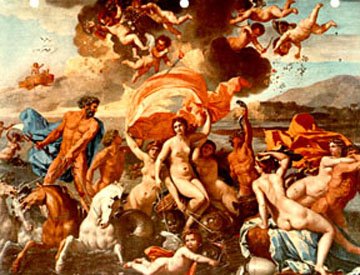
So the return of Poseidon to the sea is not only a selfish claim -- there is that -- but it is also a marriage. And that marriage is not only a symbolic appropriation of the feminine - criminal, to many contemporary eyes -- or at least, that symbol dives deeper, for “marriage to the feminine” is a re-uniting of developed consciousness with its maternal and feminine depths. We emerged from the sea and walked forth, we woke and spoke words, we built cities and empires, then found ourselves looking over our shoulder, back toward lost days, back to the waters we came from, back to the infinities disclosed in the blue.
We weren’t the first animal to return to water, as Rachel Carson tells us in The Sea Around Us:
***
Some of the land animals returned to the ocean. After perhaps 50 million years of land life, a number of reptiles entered the sea in Mesozoic time. They were huge and formidable creatures. Some had oarlike limbs by which they roved through the water; some were web-footed, with long, serpentine necks. These grotesque monsters disappeared millions of years ago, but we remember them when we come upon a large sea turtle swimming many miles at sea, its barnacle-encrusted shell eloquent of its marine life. Much later, perhaps no more than 50 million years ago, some of the mammals, too, abandoned a land life for the ocean. Their descendants are the sea lions, seals, sea elephants and whales of today. (14)
**
So the procession of sea-animals which accompanies Poseidon and Amphitrite represent a legion of animals that had gone back to water, bulls and rams and horse and lions, all masters of ground now something stranger and stronger in the aquaous element. That they are ridden by Nereids posits the relationship of maternal or feminine riding on something even deeper or older, animals, and water-animals at that: so the marriage of Poseidon is a linking back through all the orders of the world, laying claim to the sea.
There is some measure of humility in this too, since it was adequate to speak of Poseidon as “Husband of Amphtrite of the the golden spindle.” No name necessary, just function: that’s a good way to praise the ego which remits itself. To give more praise to the Husband would be to overreach his role in the process.
***
NAXOS
September 2004
Eros is a mighty daimon
but an army of lovers
can be beaten here
with just a word: No.
Desire ends where it
begins, at that
honeyed source just
beyond my lips,
in a name I know
but cannot say,
not yet, its
brilliant beach
and blue surf dropped
from rounded hips
so casually, with
such killing grace.
As soon as I say Yes
or Come she then
departs, as if along
a loosening and
diffuse spray of surf,
receding like a
tide as I approach,
forever just out
of reach, silencing
me down to this.
And when I say
No or Go I hear
the rise and fold
and tumescent crash
welcoming me with
open arms of crazy
foam, pleading all
the words I meant
to say but lost.
so it goes between
the word and its beloved,
forever here and gone,
an icy sweet peramble
which melts the names
back down the well,
though raise them here
somehow I’ll try.
She will not come
unless I refuse her,
she will not stay
unless I let her go.
And so I’ve learned
to assault love from
the rear, marrying
the verses to its
wavelike curve and
crash by loosening
the cincture of my
sense, merging
noun and sound
and then horsing
them upon both
sine and wave
where you and I
are one bedraggled
castaway upon
this rock, this tiny
island in God’s stream
where what we know
we copulate
and what we don’t
we dream.
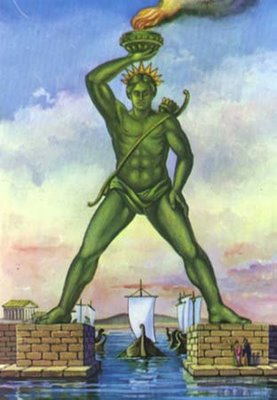
May 29
THE COLOSSUS
When Alexander’s son Demetrius approached the island city-state of Rhodes in 305 BC, he found the city’s walls well defended against his force of 40,000. So he had enormous siege towers built, the cruelest of that day. The first great engine had been erected on six ships and was blown over in a storm. The second, even larger one was called Helopolis and was fashioned on land; the city’s defenders stilled it by flooding the land in front of the walls. When a relief force for the city arrived Demetrius was forced to flee, leaving behind most of the siege equipment.
To commemorate the victory the Rhodians built the Colossus, a statue of the naked shape of Zeus, holding high a torch. The creation of the famed sculptor Lysippus, the Colossus was said to stand some 100 feet high and took 12 years to build, much of it from pieces of the siege equipment Demetrius left behind. Some say it stood straddling the harbor at Rhodes (though that’s doubtful, given its breadth).
Only 56 years later an earthquake destroyed much of Rhodes and toppled the Colossus, breaking it off at the knees, its weakest point. Ptolemy offered to have the statue rebuilt, but an oracle made the Rhodians believe that they had offended Helios and refused.
The remains of the Colossus lay on the ground for some 800 years and were even thus one of the seven marvels of the ancient world. Many travelled far to marvel over the ruins. Pliny the Elder said that it was impossible to wrap one’s arms around the thumb. In 654 AD an Arab force under Muawiyah I captured Rhodes, and the remains of the Colossus was sold to a travelling salesman from Edessa. He broke down the remains and hauled the bronze scrap on the backs of 900 camels.
Pieces continued to turn up for sale for years along that caravan route, but eventually all traces disappeared. It wasn’t until 1989 that the first remnant was thought to be found, when a huge block of stone was dredged up from the harbor of Rhodes and believed to be a fist. But it was only stone and mud debris thrown into the sea by a bulldozer.
***
COLOSSUS
Even lying on the ground, ‘tis a marvel.
-- Pliny the Elder
Why man, he doth betride a narrow world
like a Colossus, and we petty men
walk under his huge legs and peep about
to find ourselves dishonorable graves.
-- Cassius referring to Caesar in
Shakespeare’s Julius Caesar, I.ii.136-9
Yesterday we planted blue salvia
and white and purple angelina
in the garden. It was a towering
hot day, breathless, cloudless,
into the upper 90s by mid-morning;
the whole neighborhood was
stilled, feeble in the sounds
of its Sunday labors, as if the sun
god’s weight had smashed
our block into ruins.
My wife and I weren’t
working together well, the
both of us bitchy, squabbling
over design -- what comes out,
what goes where -- But thanks
to past experience with
working through our funk
we got on to our task,
finishing well after noon,
burnt and sweating hard.
We stood together at the
garden’s entrance surveying
what we had done and
felt proud, of our work
and each other. After
cleaning up we ate pasta
salad & cold watermelon
on the back porch, watching
clouds to the north amass
and rumble, delivering
ten minutes of dazed sprinkle
then turning bright again.
“There are two things
every person needs,” my wife
said as we watched the
thin rain fall: “A pet
and a garden.” I agreed.
I napped hard & then woke
to my wife enraged and
weeping over an Ebay
sale that had gone from
sour to all bad, the buyer
of her carefully-tended
linens raising hell over
condition, sending email
after email calling my
wife a liar, and now PayPal
had decided in that
awful person’s favor.
Another left hook from
bad luck for my wife,
another bad chapter
in her bad year,
another reason to despair
of her beloved business
of ever turning a dime.
She raged at me but good
for being lackadasial
in sympathy, begrudging
all the time I’ve had to
spend talking it over and over,
the time I spent helping
write reasoned rebuttals
to those indifferent powers
of Ebay and Paypal,
efforts which all, it
seemed that overheated
day, had come to naught.
“Some day you’ll come
home and I’ll be gone,”
she said crying on our
couch, our cat cowering
underneath, terrified
of her anger. “Then
you won’t have to worry
about indulging me any
more.” For rest of the day
I felt the keen blades of
failure, this rebuilt marriage
come to naught, our fortunes
slowly withering in the
omnipotence of bright powers
who simply yearn it seems,
to burn us in our tracks.
I drove to the video store
and searched an hour for
nothing & came home with
naught. My embittered wife
was embroidering something
beautiful on a sheet for
her mother to give to her
sister on her birthday, $200
worth of work she’ll get
paid almost nothing for.
I put on Bill Evans' LP
“You’ve Got To Believe
In Spring” -- bought the
day before in a flea market
near Daytona Beach --
and listened bittersweetly
to it as I made Cobb salad for
dinner, the day outside
darkening with another storm
which failed to delve us
rain. My eyes were weepy
from allergies in them
assaulted by the day’s sweaty
work outside, making me feel
like I had been crying hard
and long. My mood and the
music made me think back
on that hard season in 1995
when I first heard Bill
Evans through this album.
I was divorced, dead-ended
in my job and growing sour
of any hope of finding
a place in poetry, wanting
to go back to booze but
holding back, knowing that
last resignation would drown
everything else: And had fallen
hard for a girl-woman at work,
my desire for her growing
oceanic in the the knowledge
that it couldn’t be. I remember
the sound of the title song
inside a moment when she
and I came back from a downtown
bar (she drinking beer, me
O’Doul’s) sometime after
midnight on a work night,
that sweet sad music
and the hour defining
something colossal in
my heart -- not proud
and tall for anything I
could achieve,
but rather in how much
was revealed when all that
desire crashed -- perfect
ruins, a marvel of imagined
heights no human arms
could wrap around, not even
a severed thumb of it.
The sons of Poseidon had
set the precedent at Rhodes
in mythic times, refusing
Venus her harbor, receiving
her punishment as she
turned their desire back
toward their mother, causing
Poseidon to drive them
underground. Lesson
One: Resist love at your
peril. Ages later the city’s
men raised a Colossus
in triumph over a mortal
enemy they barred harbor to,
offending not, I think,
the sun god Helios,
but its watery derange
we call Poseidon.
You struck the Colossus down
in an earthquake, breaking
pride and joy at its knees.
Lesson Two: I survive
love at my peril. In
love’s ruins I met my
my wife and married her,
building this house,
shattering it with desire
and then finding solace
in what comes after,
the humility and power
of ruins. But some days
were like yesterday and
I feel that love is only
ruins, a godly defecation,
the spoils of so much
augment trapped in
human hearts. Ah well.
We watched “The Big
Lebowski” on DVD as
we wearied on toward
sleep, sprinklers calming
the blistered garden,
our new additions there
like tiny siege towers
meant to break us. Oh,
how hard we laughed
at John Goodman in
that movie, laughed hard
and sadly at ourselves.
We bedded early praying
termites not come out
from the works to dance
on our fallen dreams. I
wake to a sea-god’s laughter
beneath Bill Evans’ spring.
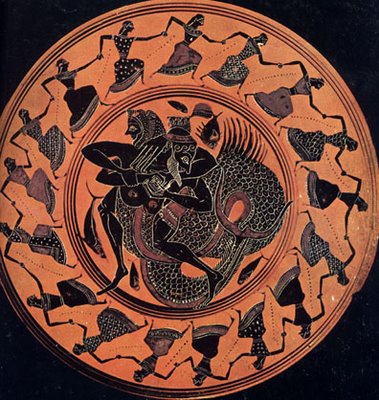
May 30
Poseidon, the turbulent husband not only of Amphitrite, but also of many Nereids, naiads, nymphs and heroines, was the father of many sons who played their parts in heroic saga. Amongst these were not only heroes, but also savage, violent beings who were defeated by the heroes -- such beings as Polyphemos the Kyklops, whose punishment by Odyssesus called forth the vengeance of Poseidon.
Hesiod called Triton “him of wide force,” and described him as a great god who dwelt at the bottom of the sea, in the golden palace of his beloved mother Amphitrite and his lord and father Poseidon. The poet declared that he was a terrible deity. I have mentioned his love affair with Hekate, and also that Herakles overcame him by force in the presence of the threefold “Old One of the Sea” -- whose art of metamorphosis the younger god apparently did not possess.
Triton was half fish, half human in shape, and can best be compared to the Silenoi and Satyroi. His only difference from them lay in the fact that they developed from disguised human beings into land-creatures, whereas Triton’s prototypes were men who decked themselves with the tails of fishes or dolphins.
The tales concerning Triton can be summarized as follows: He was the Silenos or Satyros of the sea, a raper of women -- indeed, a raper of boys, too, and from of old these rapes were performed by several Tritons at once -- a being who could awaken terror and lead men astray with his conch-horn. The Tritons were sometimes accompanied by Tritonesses. But usually it was Nereids who accompanied them as they swam in nuptial processions through the sea, celebrating the marriage of Poseidon and Aphrodite {sic -- Amphitrite?}, or the birth of Aphrodite, or those mysteries that were said to have been revealed by the Nereids to mankind.
-- Carl Kerenyi, The Gods of the Greeks
***
TRITON
She whispered the Triton’s
dark oracle in my ear
as I swirled down from our
tensely spasmed wrap
into the blackest folds
of dream, her voice now
his, a sound of surf and
debacle, ten thousand waves
snaking from a mouth
of cruellest blue:
***
Forget booze. I distill a
far deeper darker flavor
in the abysyms of the heart,
the most dangerous brine of all.
One sip and you’re falling water,
not fresh either but mine
to rape in divinest thrall.
Look out the window
and it’s 4 a.m. on a summer's
night with everything
humming and aswoon,
quiescent in every human
way, drifting at the bottom
of hot bright days. Yet in
this dark the sun yet boils,
loined in my conch-horn
whose bass is three
stops down from vox
humana, too low for
human ears or sexual gears
but sounding in both
nonetheless, as whale-
flukes churn, slapping
sacred precincts to
full attention, a fuck heat
cauled inside the frozen
press of deep-water waves.
I rouse you with your
worst desire here
at the bottom of that sea,
a mare’s ass plump for
cocking deep in godlike
impunity, rioting the
nocturnes of ball-salt bliss.
Satyrs are just the half
of my descending dance,
their wino greed
just the first fist
of that far older juice
I squirt from my mother’s
tits, queen of every deep
and wife of Poseidon,
vanquisher of her seas.
Every shore you walk
shouting names of God
is just the lip of a precipice
I am the eternal plunge
off from. I am that sound
inside a wave’s collapse which
thunders high pleasure down,
he black rip current
in your every bluegreen hurl.
I do not sate, I cannot praise
what does not plunge in darkest swirl.
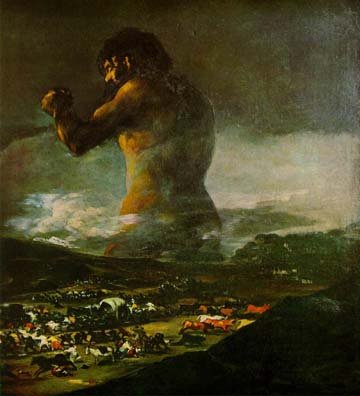

<< Home